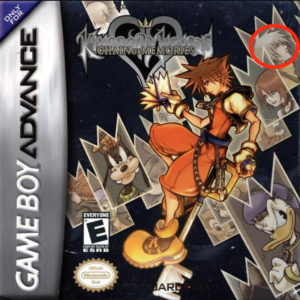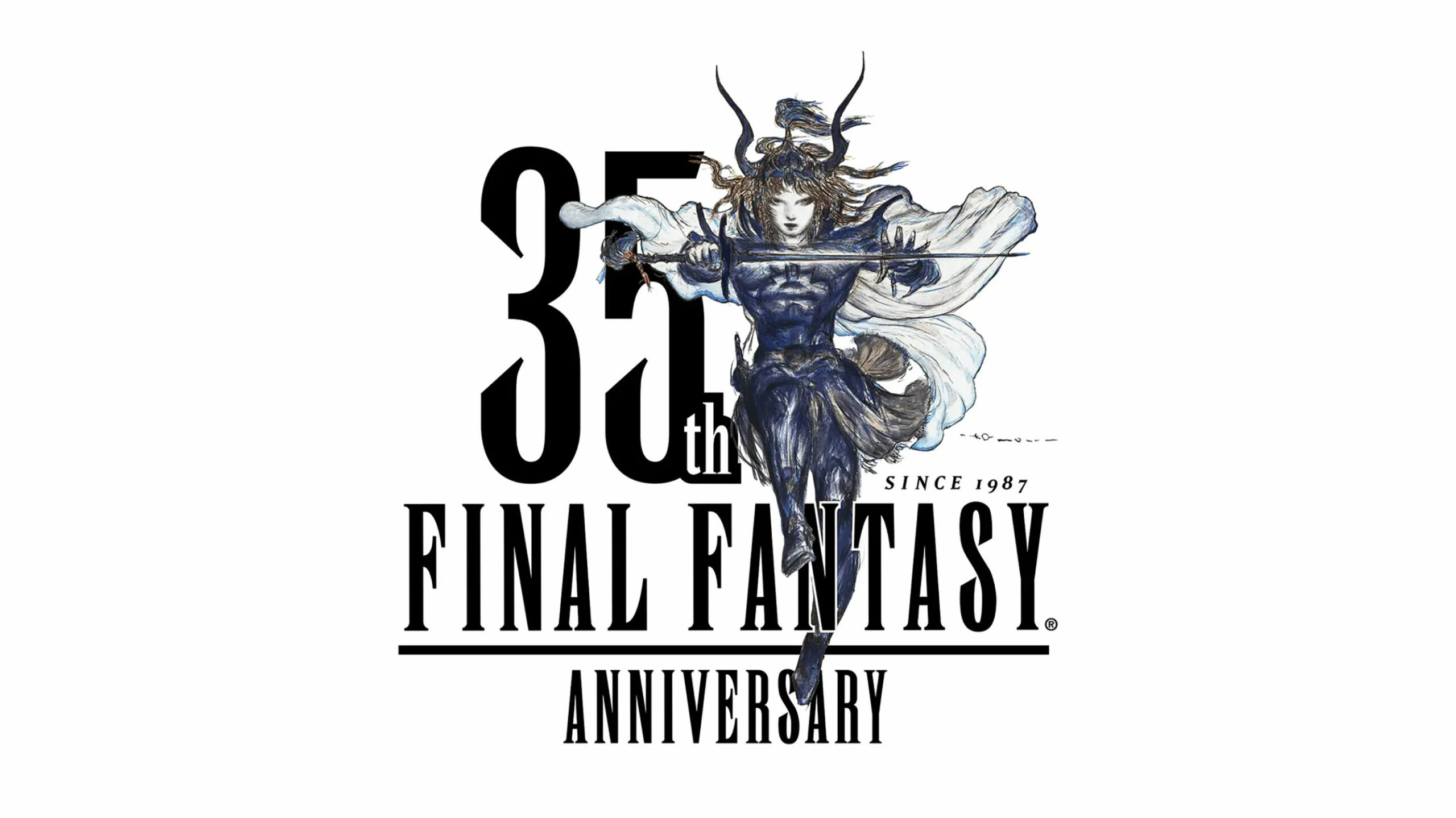
My introduction to Final Fantasy is a bit funny.
When I was 10, my best friend got a new game for the GBA: Kingdom Hearts: Chain of Memories. He hadn’t actually played the original Kingdom Hearts on the PS2; instead, he picked up this handheld sequel because his brother’s friend had erroneously told them it featured Inuyasha, the main character of his favourite anime.
No, I’m not kidding — I guess kids really do say the darndest things.
Thankfully, we ended up falling in love with Chain of Memories, and one character quickly caught our eye: Cloud. His perfectly coiffed hair, badass bandaged sword, enigmatic black wing and face-covering scarf… he was the epitome of cool (everything I most certainly wasn’t). Imagine our surprise, then, when we found out he actually had his own game, Final Fantasy VII! My friend’s mum quickly bought it for him, and he devoured it. I didn’t get to see him too often since he lived far away, so I was anxious to hang out again and hear what he thought in person.
Eventually, he loaned the game to me, gushing praise, and my mind was blown as soon as booted up my PS1 and I began the thrilling opening bombing mission. I’d never experienced anything like it, and it would eventually, quite literally, change my life. But another reason that I love FFVII is that it introduced me to the broader Final Fantasy series, which has since become my all-time favourite in gaming. So today, December 18th — exactly 35 years after the original Final Fantasy debuted on the Famicom (NES) in Japan — I want to celebrate that. Here’s to the legendary RPG series from the little Square team, led by the big-dreaming Hironobu Sakaguchi, that dared to shake up the game.
A new adventure, every time
After VII, I wanted to play as many of the other Final Fantasy games as I could. That wasn’t exactly easy, given the gaming industry’s spotty-at-best track record when it comes to preservation. To its credit, though, Square Enix did release ports of FFI, II, IV, V and VI on the GBA, and that’s where I was able to first play all of those titles. And my god, did I fall in love. (I’ve since finished every numbered single-player entry in the series.)
As someone who was painfully introverted growing up and often cities or even countries removed from many of the friends and family I did hold dear, I regularly found myself drawn to games. After all, they are, in many ways, the perfect form of escapism. They whisk you away to worlds you could never have imagined and let you inhabit them in ways that no other art form can. Final Fantasy, for me, has been my biggest provider of such experiences.
そして… たんきゅうのたびははじまった
FF35周年おめでとさん#FF14 #スクウェア開発室 #sakaGUCCI pic.twitter.com/6r8qXJxr4c
— 坂口博信 (@auuo) December 16, 2022
Unlike most series, Final Fantasy takes an anthology approach, so every numbered entry is its own standalone experience. As such, it feels consistently fresh. The original five games are different spins on traditional medieval fantasy featuring mix-ups like interdimensional travel (V‘s Rift) and even moon landings (IV). From there, it gets even more interesting: VI is all about steampunk, VII has a refreshing cyberpunk flavour, VIII sports a distinct “anime schoolboy” vibe and X is more Southeast Asia-inspired. Discovering where each new FF takes place, and all of the ways in which each world feels unique, has proven to be delightful highlight of the series.
Of course, it’s the individual stories that help further distinguish these settings, and Final Fantasy has always done that magnificently. VI used the familiar backdrop of an evil empire to tell a heartwrenching tale about people struggling to find meaning in a dark, often depressing, world. Feeling more timely than ever in 2022, VII explored themes of life and identity and how a ruthlessly greedy megacorporation’s planet-killing business threatens to upend it all. While paying homage to the medieval FFs of old, IX also focused on the importance of love and friendship, especially in the face of mortality. X‘s world of Spira, meanwhile, warned about the potential dangers of organized religion. Taking cues from Final Fantasy Tactics, Final Fantasy XII was rife with political intrigue. Then there’s XIV, which has become a massive and beloved series in its own right thanks to an engrossing, sprawling and ever-evolving MMO story. Hell, XV, at its core, was literally a charming road trip between four bros. Pretty much every Final Fantasy game, even the weaker ones, has brought something new to the table, and I love them all for that.
Literal game-changers
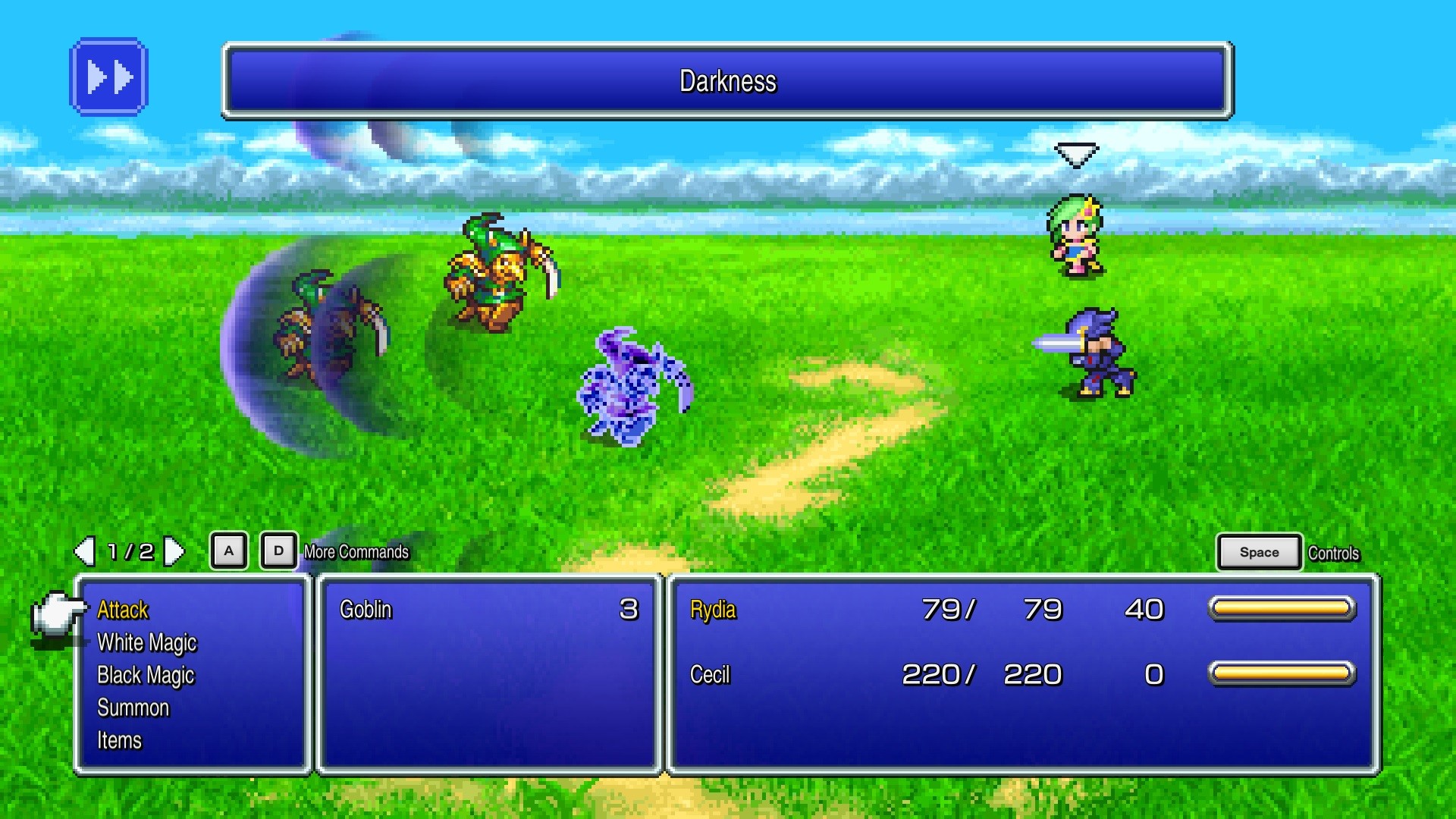
The Pixel Remaster of Final Fantasy IV.
That ethos has also extended to the gameplay. Indeed, what I most admire about Final Fantasy is its unwillingness to follow the same playbook. Over the past 35 years, the franchise has experimented with so many different kinds of gameplay, and many of them have been resounding successes.
The most impactful of these has been the Active Time Battle system, originally designed by legendary developer Hiroyuki Ito for IV in 1991. In a feat of utter brilliance, Ito took classic turn-based RPG combat and injected speed and energy into it. Essentially, party members and enemies alike would have to wait for a bar to fill up before they could attack, adding a level of urgency and real-time action to the fray. Later games would add further layers to combat in their own compelling ways, like V‘s remarkably deep Job system allowing for rich party configurations, the intricate and highly customizable Materia of VII, X‘s open-ended and addictive Sphere Grid character progression method or XII‘s more MMO-inspired Gambit system to oh-so precisely fine-tune companions’ AI behaviour.
At the same time, we’d still occasionally get returns to traditional turn-based mechanics, like X, which cleverly used this format to encourage strategy by making you decide when to swap in teammates and attack based on a bar that displayed who’s up next. And that doesn’t even take all of the spin-offs and other offshoots into consideration. Final Fantasy VII Remake, for example, is a masterful blend of ATB and real-time combat, delivering utterly thrilling battles that feel fast, fluid and strategic. Or take Strangers of Paradise, a smart, brutal Nioh-esque spin on Final Fantasy that also doubles as a fascinating villainous origin-prequel story to the original Final Fantasy. The fact that Square Enix is finding ways to breathe new life into decades-old tropes and systems never ceases to impress me.
People to root for
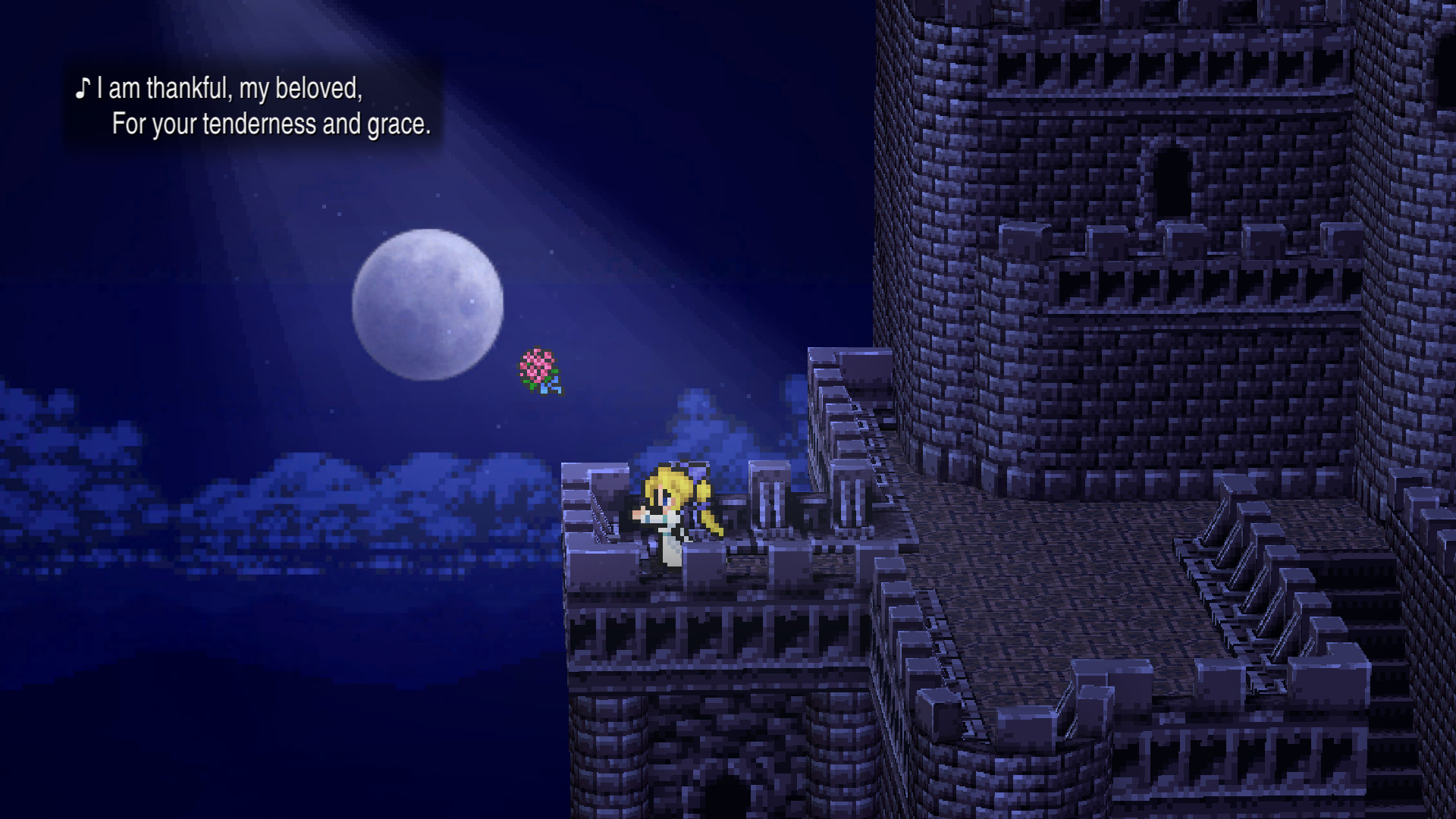
The famous opera scene in the Pixel Remaster version of Final Fantasy VI.
Would any of this matter, though, if you didn’t care about the characters themselves? Thankfully, Final Fantasy has truly succeeded in crafting well-realized, nuanced and memorable figures for many years now. In fact, it wouldn’t be an understatement to say that so many of this series’ casts rank among my favourites in any medium. That all boils down to the unique interactive elements of games that you make you truly engrossed in your characters’ plights since you actually get to live through them yourself. Over the course of dozens of hours of well-written narratives, you come to truly relate to them.
Maybe that was in VI, where Celes’ struggles with allegiance led to a profoundly moving opera performance or devastating struggles with depression. Perhaps you’re like me and most closely identified with VII — specifically, Cloud’s deep-rooted issues of self-worth and longing for acceptance, and also found inspiration from Zack’s story in Crisis Core. Many have also gravitated towards Vivi’s arc in IX, a surprisingly existential quest that serves as that game’s emotional centre. Others, meanwhile, might resonate with X‘s Yuna, a strong-willed young woman burdened with an unfair responsibility that she nonetheless compassionately shoulders.
In many of my loneliest and darkest moments, I found so much solace in these characters; I connected with them in ways that most other games couldn’t speak to me. In a sense, the series grew over time in terms of maturity and complexity, much in the way that Harry Potter‘s coming-of-age story becoming darker over time made it click so much with my generation. For Final Fantasy, that growth was no accident, either. Sakaguchi has been open about how his earlier creative failures led him to keep the stories of the earlier Final Fantasy titles relatively light, but the untimely death of his mother inspired him to draw from his emotions to pen deeper, more impactful narratives in future projects. One of the biggest examples of this was the Lifestream in VII, a beautifully spiritual exploration of the afterlife and what binds us all together. Both Sakaguchi and Final Fantasy as a whole have gone on their own personal journeys, and through them, so have I.
World-class scores
But the beating heart of Final Fantasy, for me — what unifies everything I’ve mentioned and makes it all work — is the music. I’ve long said that Final Fantasy has some of the best scores in any medium, and the key reason for that is Nobuo Uematsu. It’s not hyperbole to say that he is to Final Fantasy what John Williams is to Star Wars, especially since both have been so inextricably involved with their respective series since their inception. Indeed, so much of Final Fantasy‘s emotional resonance stems from Uematsu’s music. Honestly, this whole piece could have been solely about Uematsu, whose music is genuinely unparalleled. Even from the very beginning, we had the rousing victory fanfare that truly makes you feel like you triumphed over evil, or the stirring, majestic main theme.
And since that original 1987 title, Uematsu has gone on to compose some of the greatest soundtracks in all of gaming. “The Rebel Army” in II was an inspirational ode to the bravery and spirit of those who push on. Cecil’s redemptive arc in IV rings true thanks to the enchanting “Theme of Love” that punctuates his romance with Rosa. The fights in V against the endearingly goofy Gilgamesh have become classic in no small part due to Uematsu’s banger “Battle on the Big Bridge” theme. Despite SNES technical limitations, Uematsu managed to compose VI‘s “Dancing Mad,” a nearly 20-minute long, multipart piece that perfectly captures the stunning grandiosity and haunting lunacy of the now-deified Kefka. (To say nothing of how impressive VII‘s final boss theme, “One-Winged Angel,” would also prove to be.) And speaking of VII, would Aerith’s death, one of gaming’s most iconic scenes, have been so powerful without her heartbreakingly solemn and innocent melody? What about “To Zanarkand,” which uses understated-yet-sorrowful piano keys to define the star-crossed romance of Tidus and Yuna? I could go on. When you consider that the bulk of his Final Fantasy compositions were for I to IX — released between the NES and PS1, retro consoles that lacks the sound toolsets afforded by modern hardware — then Uematsu’s work feels even more magical.
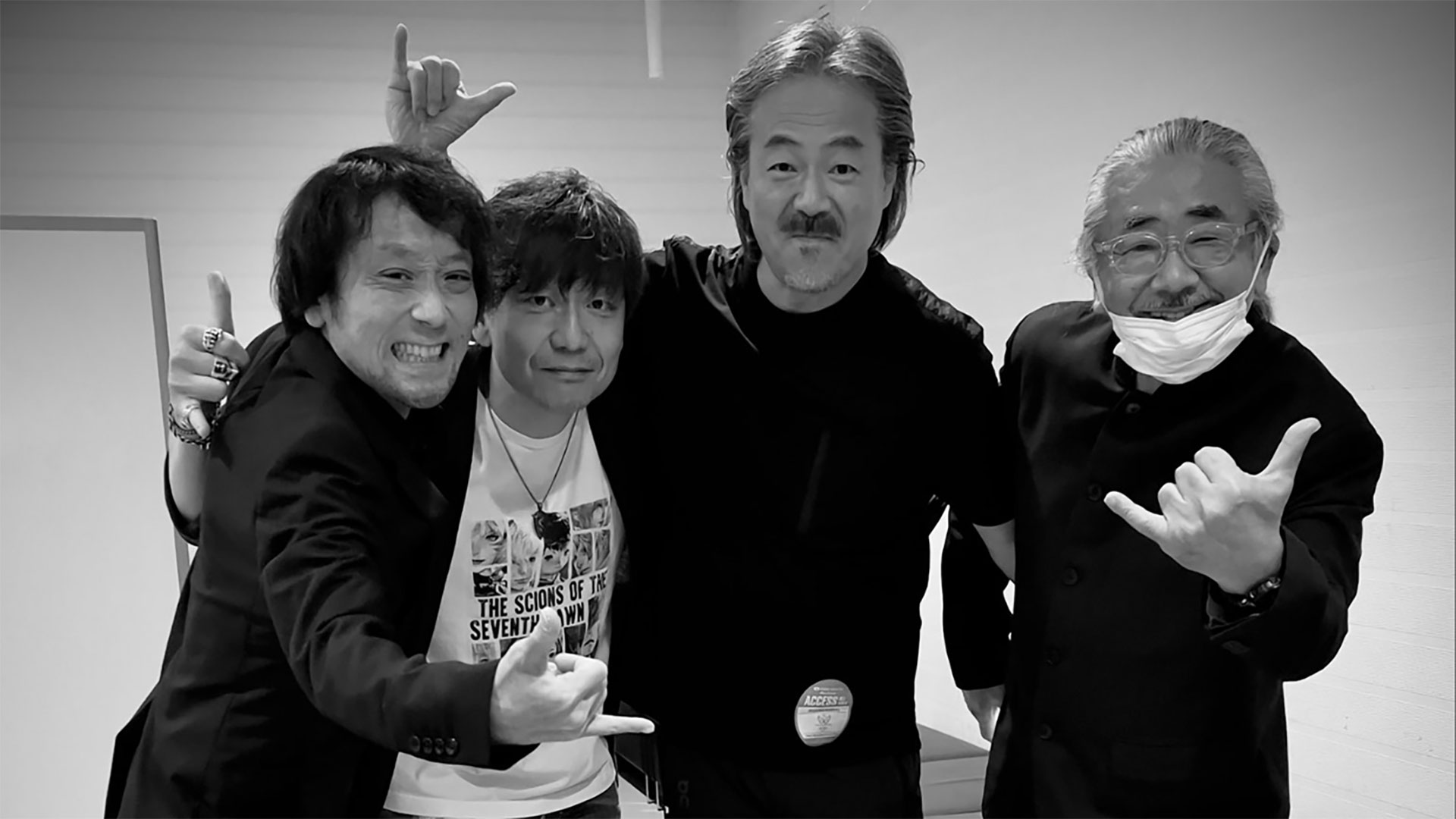
The old and new guard of Final Fantasy. From left to right: Masayoshi Soken, Naoki Yoshida, Hironobu Sakaguchi and Nobuo Uematsu (Image credit: Hironobu Sakaguchi)
And the best part? Uematsu has only inspired other wonderful musical talents to join Final Fantasy. Hitoshi Sakimoto (XII), Masashi Hamauzu (XIII), Masayoshi Soken (XIV) and Yoko Shimomura (XV)… all brilliant in their own right, and all carrying on Uematsu’s legacy. Whether it was feeling isolated during school, taking the bus home or slaving away at homework assignments, to more recently writing for work, going to the gym or just sitting alone with my thoughts, the music of Final Fantasy from all of these composers has always been a significant part of my life, like a warm, beautiful blanket.
A living legacy
While looking back for the anniversary, I also have to acknowledge that the future of Final Fantasy is also looking so bright. On one side of Square Enix, we have Creative Business Unit III, led Naoki Yoshida, who continues to push forward on incredible expansions to Final Fantasy XIV. This division is also working on XVI, which looks to create a wonderful marriage between the medieval settings of old with a darker fantasy narrative from Kazutoyo Maehiro, writer of XIV‘s stellar Heavensward expansion, and frenetic action-RPG combat from Devil May Cry veteran Ryota Suzuki. And on the other side, we have Tetsuya Nomura, Yoshinori Kitase and several other Final Fantasy mainstays — who most famously spearheaded VII with Sakaguchi — overseeing an outstanding and bold reimagining of the PS1 classic, starting with 2020’s Remake and continuing with Rebirth and an untitled trilogy capper. All of these projects look to remain true to the spirit of Final Fantasy — unforgettable stories and characters, gripping gameplay systems and god-tier music — while continuing to push the series forward in exciting ways.
Final Fantasy has had its ups and downs, like just about everything, but it’s that consistent drive to deliver fresh, engaging and emotional experiences that makes it win out for me. It’s been a constant in my life even when so many unexpected events — like becoming estranged from my father — have happened. The prospect of a new game, with new adventures and characters and music to discover, always proves to be a source of joy for me. After all, the amount of memories I’ve formed and the friends I’ve made from this series is staggering. The adoration and gratitude I have for Final Fantasy is pretty much unmatched.
So, here’s to 35 years of something truly extraordinary, and I can’t wait to see what comes next.
Image credit: Square Enix
MobileSyrup may earn a commission from purchases made via our links, which helps fund the journalism we provide free on our website. These links do not influence our editorial content. Support us here.

